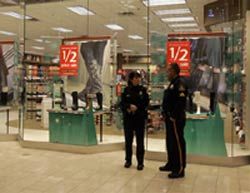By Sgt. Jeff Baker
Omaha Police Department
P1 News Report: 9 killed, 5 injured in Omaha mall shooting
After 20 years in law enforcement, I thought I’d seen it all. I’d worked as a rural deputy sheriff, multi-jurisdictional narcotics task force detective and police sergeant in a metro area of 800,000 people. I lost a friend and former trainee when he was ambushed and shot to death in his cruiser; I suffered through my partner’s criminal trial after he stood accused of excessive force (he was acquitted). I survived two shootings in two years; rape, robbery, killings, child abuse, drug-addled homeless, vehicle pursuits, the “Revolving Door of Justice,” draconian policy from police administrators, a disconnect between cops and the public and everything in between.
Indeed, I was confident I had taken in just about everything one could reasonably expect to be exposed to as a law enforcement officer.
I was wrong.
 Omaha Police Mobile Command Center is seen outside the entrance to the Von Maur store Thursday, Dec. 6, 2007. (AP Photo/Dave Weaver) |
On Dec. 5, 2007, at 1342 hours, the entirety of my training and experience culminated in a single radio call that would forever change the lives of those involved: An active shooter, the apex predator. A calm, deliberate and seemingly remorseless gunman with a high-powered military-style rifle. Multiple magazines at his disposal, each brimming with ammunition capable of passing through concealable soft body armor. Unlimited places for the murderer to hide and a target-rich environment full of civilians in a “gun free zone,” a massive shopping mall of about 135 stores during the Christmas season.
After what seemed like hours, the full magnitude of the horror was revealed to us: A dozen citizens shot, eight dead, two battling for their lives in area trauma wards. The 19-year-old suspect was dead from a self-inflicted gunshot wound.
As one of the first three police officers in the doors of the Von Maur department store that day, I experienced a wide array of emotions. Too often, we in the policing profession hide our feelings about the sights and experiences we endure. Thankfully, in recent years the machismo has given way to a realization that post-traumatic stress disorder is real. Officers involved in critical incidents are talking (and healing) rather than resorting to stuffing it away.
Two primary feelings I’ll discuss here, fear and resentment, aren’t terribly comfortable topics of conversation, but I believe the more honesty we bring to the conversation, the better prepared officers who follow in our footsteps in future incidents of this nature will be prepared to deal with them.
Fear
I’m just gonna say it: Responding to this incident proved jarringly scary.
As the supervisor dispatched with district cars when the call was first broadcast, fear crept in that we would not get there in time — this despite a 100-plus mph response on a congested freeway leading to the mall.
My mind was racing as fast as my black-and-white: Is he still killing people? Will we make it in time? Will we be able to get to him before he hurts anyone else? What if he takes hostages? What if there are secondary shooters or explosive devices as there were at Columbine? What if a police officer goes down?”
Police are not soldiers per se, fighting a guerrilla enemy we cannot see, but this day was different.
I arrived and entered the store, scanning across the top of a 12-gauge shotgun loaded with rifled slugs. I fought the instinct to announce my presence as it has been ingrained in us to do. I couldn’t afford to reveal my position to the gunman. In a breathtaking moment, two terrified citizens popped up and raced to me, then past and out the doors behind, tears streaming down their faces.
Everywhere I looked, I saw and smelled evidence of a monster on the loose: Store employees frozen under display cases; the first gunshot victim, mortally wounded, surrounded by 7.62mm shell casings; the smell of gunfire hanging in the air, reminiscent of the firecrackers I enjoyed as a kid.
Christmas music played, eerily juxtaposed with the blaring fire alarm. I became conscious of my quickened breathing. Moderately asthmatic, I was puffing a bit as I relayed information on my portable radio to incoming responders.
Coffee cups, empty strollers and shopping bags littered the floors, abandoned at the spot people started to run. We formed up contact teams and incrementally cleared the mall, evacuating hundreds of shoppers and employees who had hidden in some unusual places.
The shooting had been confined to one store, and it had been committed by one suspect who was already dead. By the time the day ended, some 13 hours after my shift began, I was completely spent, emotionally and physically. So too were dozens of other involved officers.
Know ahead of time: Responding to an active shooter is unfathomably stressful.
Anxiety can build with serious momentum during your response. The physical taxation your body is put under is exacerbated by this psychological reality. Your dedication, training, superior tactics, determination and sworn oath as a law enforcement officer will propel you through the barrier of the human instinct to run from — not toward — the sound of gunfire.
Thus, fear does not have to be the enemy of the police professional. Fear keeps you “on the yellow” and prepared to react with extreme prejudice when the Moment of Truth arrives.
Resentment
 Members of the Omaha police department stand inside the Westroads Mall, Saturday, Dec. 8, 2007, in Omaha, Neb. (AP Photo/Jeff Roberson) |
In all, an estimated 200 Omaha police officers made it to the scene, and untold more responded from outlying jurisdictions. Irrespective of agency, every “true-blue” cop I’ve talked to in the wake of this ordeal relays the same feeling of resentment that the shooter took his own life, unwilling to go head-to-head with the people equipped and prepared to meet him on the slaughter fields.
Admitting to outright anger over circumstances that did not allow us to deal a death blow to the suspect might seem macabre to some, but that’s the world real cops live in. Make no mistake, we do not yearn for a call of this nature to erupt; but when it comes, we want to be there, to test our mettle against that of a ruthless killer, to save the lives of innocent people who pay our salaries or die trying.
This is not about martyrdom, it’s about reality. The law officer is cognizant of the increasingly violent realities of the world, and while praying it doesn’t happen in our hometown, we’re sober-minded enough to accept the fact, given sufficient time, it probably will.
I encourage every officer to let that resentment go before it takes root and has a negative impact on the way you do your job.
After the incident
If left unchecked, officer involvement in a critical incident can have serious health ramifications — think of dangerous coping mechanisms like binge drinking and other destructive behavior.
Personally, I found healing in department-provided CISD debriefing, in council with my priest and spiritual director and in prayer.
If you’re into strength training or running, stay on your workout schedule. If you’re not, start. My time in the gym was critical to the “decompression” process. Surround yourself with loved ones — your support network — and be willing to use the fellowship with your brothers and sisters in arms. You may never know the positive effects of giving a hug or slapping someone on the back and telling them you’re proud of the job they did. We all need a little bit of affirmation at times.
Remember, dealing with an active shooter and multiple causalities is more than the tactical X’s and O’s of search teams, room clearing and victim evacuation. Emotion, the elephant in the corner for us cops, is something you will invariably deal with, in real time during the incident and moving forward after the dust settles.
Be prepared when the wolf comes. Accept the anxiety, sadness and confusion that can come in those dark moments. Knowing ahead of time to brace yourself against images and impulses you may never have experienced — at least at this level — may make all the difference in successfully managing the incident, as well as your own mental well-being in the aftermath.
Sergeant Jeff Baker is a veteran of 20 years in law enforcement and is a past recipient of the Omaha Police Medal of Valor for his actions in a shootout with armed robbery suspects. He is the former editor of
The Shield, the official publication of the Omaha Police Union, Local 101. He enjoys his Catholic faith and strength training, and is blessed in marriage to his wife, Denise. Sgt. Baker can be reached at opdsgt@gmail.com


